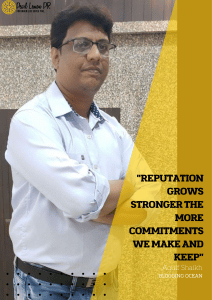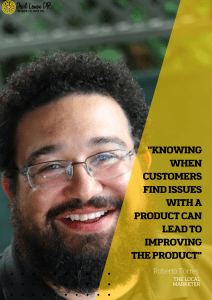‘Cancel culture’ – a practice that was birthed from the #metoo movement– has been the general public’s digital weapon against what they deem unfit to exist on an elevated platform. It’s not just celebrities whose reputations have been tarnished; businesses and brands have fallen prey to this preditor. So how do these businesses keep their shields up and protect their reputations? And in the event of a slip-up, how do brands recover?
We asked media and digital consumption experts to share their thoughts and tips regarding these and more questions.
Ready to delve deep into this? Let’s go!

 Dragos Badea from YArooms states: “Your firm’s reputation takes ages to build up to a good level but just one mistake can render all of your efforts useless overnight. Think of a company like Tesla – goodwill vanishing like water down a sieve with a few tweets from their CEO. Managing your brand’s reputation is never easy; hiring a brand management agency might be your best bet. One actionable tip is to ensure you’re always seen as responsive. People are often genuinely shocked that a business reached back out to them – these responses tend to go viral and garner a ton of goodwill.”
Dragos Badea from YArooms states: “Your firm’s reputation takes ages to build up to a good level but just one mistake can render all of your efforts useless overnight. Think of a company like Tesla – goodwill vanishing like water down a sieve with a few tweets from their CEO. Managing your brand’s reputation is never easy; hiring a brand management agency might be your best bet. One actionable tip is to ensure you’re always seen as responsive. People are often genuinely shocked that a business reached back out to them – these responses tend to go viral and garner a ton of goodwill.”
 Michal Hajtas from Soar. sh states: “Reputation management is necessary for brands nowadays. People tend to do more research before the purchase than before, and they use several channels to do so. My tip is to start engaging with other members on Reddit, Quora, LinkedIn, Medium and online forums. These platforms are pretty strict regarding their algorithms and rules, and it can become very time-consuming when you want to do it all by yourself without any experience. However, keeping your online reputation positive is essential, so consider outsourcing it to an external agency.”
Michal Hajtas from Soar. sh states: “Reputation management is necessary for brands nowadays. People tend to do more research before the purchase than before, and they use several channels to do so. My tip is to start engaging with other members on Reddit, Quora, LinkedIn, Medium and online forums. These platforms are pretty strict regarding their algorithms and rules, and it can become very time-consuming when you want to do it all by yourself without any experience. However, keeping your online reputation positive is essential, so consider outsourcing it to an external agency.”

Claudia Vilches from The PR Influence states: “Reputation management is essential for brands; it serves almost as a foundation to your brand tone and key messaging. How you manage the reputation of your brand can either sink you right away or be what keeps your image afloat in the long run .”

Jay Bats from Content base states: “A qualified public relations consultant: Of course, hiring a strategist is essential to manage a company’s reputation effectively. Internal Communications (IC) is regarded as a “nice to have,” non-essential, and non-strategic department, particularly by more quantitative top managers. It takes a lot of effort to overcome these assumptions. By being nonstrategic, nonquantitative, and generally stupid, IC professionals frequently promote these notions. A strategic public relations expert could assist the internal team in moving away from just delivering outputs and toward outtakes and results that demonstrate ROI. Measurement is important to the success of any strategy.”


Rameez Usmani from WebHostingAdvices states, “Consistency in social media profiles has several advantages. It aids in your discovery and recall. It also conveys your brand’s authenticity and reliability. Use the same username across all social media platforms and your website to generate uniformity and ease memory recall. Register with one of the major social networking platforms to use a personal brand and protect ownership of your website’s name. So no one can use your brand names for something unrelated to you. You should also keep your social media content consistent. As a rule, this means all of your profiles have the same colour scheme, logo, and layout. It also implies being consistent and brand-appropriate. For example, you can use the same images and filters across all Instagram photos.”
 Daniel Carter of Perspective Pictures states: “Keep a close eye on your brand: What was once a private chat between family or friends can now be broadcast to the entire globe with the touch of a button in today’s digital age? Many consumers now use social media to air their grievances about products, services, or companies. Some complaints may be founded on false information, leading to people making false remarks against brands on the internet. However, you must be conscious of the sources and ready to deal with them as soon as possible. You must monitor your brand and undertake social listening to keep aware of conversations happening around your brand and to take advantage of opportunities to address publicly available information.”
Daniel Carter of Perspective Pictures states: “Keep a close eye on your brand: What was once a private chat between family or friends can now be broadcast to the entire globe with the touch of a button in today’s digital age? Many consumers now use social media to air their grievances about products, services, or companies. Some complaints may be founded on false information, leading to people making false remarks against brands on the internet. However, you must be conscious of the sources and ready to deal with them as soon as possible. You must monitor your brand and undertake social listening to keep aware of conversations happening around your brand and to take advantage of opportunities to address publicly available information.”
 Deborrah Ashley from Thrivoo Marketing states: “Reputation management is necessary for a brand because it speaks volumes about its brand’s values. Nowadays, values are everything. My top tip for managing brand reputation is to stay consistent throughout your online presence. For example, if your brand claims to support women’s empowerment and you have a strong stance about it on Twitter, don’t share ads and LinkedIn posts with no women in the images. The digitally savvy audience has many ways to determine if you are disingenuous. Suppose they see that you have inconsistencies with your online presence, ESPECIALLY on LinkedIn. In that case, they’ll have no hesitation in naming and shaming, which can cause irreversible damage to your brand reputation.”
Deborrah Ashley from Thrivoo Marketing states: “Reputation management is necessary for a brand because it speaks volumes about its brand’s values. Nowadays, values are everything. My top tip for managing brand reputation is to stay consistent throughout your online presence. For example, if your brand claims to support women’s empowerment and you have a strong stance about it on Twitter, don’t share ads and LinkedIn posts with no women in the images. The digitally savvy audience has many ways to determine if you are disingenuous. Suppose they see that you have inconsistencies with your online presence, ESPECIALLY on LinkedIn. In that case, they’ll have no hesitation in naming and shaming, which can cause irreversible damage to your brand reputation.” Adam Wood from RevenueGeeks states: “Demonstrate the worth of your products. This is a great rule for many things, including brand reputation. Consumers have seen and heard it all because retail is oversaturated and hyper-competitive nowadays. They are well-versed in all marketing and advertising techniques. To gain attention, you must provide actual value—and establish a reputation for content over style. Demonstrate the value of your items to do this. Make the marketing, advertising, and merchandising materials that emphasise how your products benefit your customers. “Why do I care?” and “Why do I care now?” are two of the most crucial questions to answer. Prior to introducing your solution, concentrate on meeting the consumer’s demand. In fact, in favour of sharing your clients’ pains and concerns, the answer should be one of the last things you offer to them.”
Adam Wood from RevenueGeeks states: “Demonstrate the worth of your products. This is a great rule for many things, including brand reputation. Consumers have seen and heard it all because retail is oversaturated and hyper-competitive nowadays. They are well-versed in all marketing and advertising techniques. To gain attention, you must provide actual value—and establish a reputation for content over style. Demonstrate the value of your items to do this. Make the marketing, advertising, and merchandising materials that emphasise how your products benefit your customers. “Why do I care?” and “Why do I care now?” are two of the most crucial questions to answer. Prior to introducing your solution, concentrate on meeting the consumer’s demand. In fact, in favour of sharing your clients’ pains and concerns, the answer should be one of the last things you offer to them.”

Veronica Miller from VPN overview states: “Share Your Voice Through Organic Outlets because it is more vital than ever to share your voice so that people can learn about who you are and what you stand for. Customers can detect when you’re trying to “sell” them something versus when you’re genuinely trying to help. Locate natural outlets (blogs, forums, articles) to communicate what makes you unique, assist them with the subject matter on which you are an expert, and remain true. Your reputation and testimonials will naturally follow.”

Daniel Barrett from Social Vantage states: “ Over time, consumers have become increasingly aware of their buying mechanisms, and they take a company’s vision and ideologies in high regard. So, this is where the brand’s reputation comes in, making it something obvious to be taken care of. It might seem like a minor aspect of brand marketing endeavours, but conversations about your company are going on among your circle of reach almost all the time. Hence, I advise all businesses to invest in proper reputation management. Your team needs to research the target market and find what the masses say about your brand. Once you have the feedback and the reviews at hand, working towards a better direction will be easier.

Mike Grossman from GoodHire states: “Reputation management is always a necessary investment for a brand. In the event that your brand is subject to controversy, you need a clear plan in place. Proper preparation helps you address bad press and protect how your brand is perceived in the eyes of the consumer. If you act too late, the circumstances could permanently damage your business prospects. By prioritizing reputation management, you can more easily monitor and influence public perception in a way that mitigates threats and benefits your business. One of the best reputation management tips you could put into place immediately is asking every customer for a review. Social proof is a powerful force, and it consistently influences buyer behaviour on a daily basis.”

Kavin Patel from Convrrt states: “Provide Service to Your Customers As the first and most obvious step in enhancing your online reputation is to provide excellent customer service. Nothing is more effective than a good product and service that assists clients in resolving a business challenge. Then, after you’ve solved a critical business problem, ask your consumers to support their online success.”

Johnson Jake from Twelve Three Media states: “If you’re not taking the time to watch your brand, who is? Continuing to keep a close eye on all your platforms where a review can be left is important. Not only do customers look to reviews to understand the reputation of your products and services, but they also are one of the largest deciding factors for consumers today. Podium found that 93% of consumers today look to reviews to help them make purchasing decisions. With those kinds of stats, why would you leave anything to chance? Services like Podium and Birdeye enable businesses to keep all their online reputation in one place and are easy to manage. No longer do you need to hunt down each and every review customers leave for your company.”

Aquif Shaikh from Blogging Ocean states: “Follow through on your promises: Reputation grows stronger the more commitments we make and keep. Unmet marketing promises or merely uncontrolled client expectations, on the other hand, can be disastrous for your business. Consumers become disappointed, upset, or agitated when brands fail to uphold promises or meet expectations, and they lose faith in the brand. When we regularly create and maintain promises over time, we establish confidence with our consumers and trust within our own company, which reflects on the entire brand. Be a list of brand promises and expectations, and make sure to follow through on them.”

 Roberto Torres from The Local Marketer states: “In a recent post by Near Media, several top reputation management companies have been put on notice reminding them that restricting or filtering reviewers based on feedback violates the FTC Act. This is a point of concern when asking customers for reviews, so I’d stay away from doing this, and use the software to monitor for 3 specific reasons. Monitoring product feedback: Knowing when customers find issues with a product can lead to improving the product, addressing manufacturing issues, or better designs. A reputation management solution can let you listen in when your product is mentioned in places like YouTube, Consumer Reports, Wirecutter, and many more.”
Roberto Torres from The Local Marketer states: “In a recent post by Near Media, several top reputation management companies have been put on notice reminding them that restricting or filtering reviewers based on feedback violates the FTC Act. This is a point of concern when asking customers for reviews, so I’d stay away from doing this, and use the software to monitor for 3 specific reasons. Monitoring product feedback: Knowing when customers find issues with a product can lead to improving the product, addressing manufacturing issues, or better designs. A reputation management solution can let you listen in when your product is mentioned in places like YouTube, Consumer Reports, Wirecutter, and many more.”

David Farkas The Upper Ranks states: “Reviews are Important. When someone searches for a product or service online, they want to know they’re getting a good deal and why they should select you over the competition. In addition to typical SEO strategies, internet reviews help you complete the transaction. In order to maintain a positive public view of your brand, you must constantly monitor and manage your reputation. Build a Community -. Personalize your message to create a memorable customer experience. You should also integrate client feedback wherever feasible. Nobody wants to spend money on a company that has constant complaints. Customers will find favourable information online if you manage it. They’ll trust you back. Gaining new leads and clients is difficult without trust. Building a solid internet reputation is a good start.”

Teo Vanyo from Stealth Agents states: “Effective reputation management may quickly help a company earn trust. As a result, good feedback may boost potential clients’ trust in the business. However, a good reputation shows that the company is more dependable than its competitors.It’s critical to plan ahead of time for efficient brand reputation management. However, you should prepare yourself to respond to negative comments promptly. Otherwise, users may grow even more dissatisfied with your company and customer service.”

Masha Mahdavi from SEM Dynamics states: “Reputation establishes trust and nurtures loyalty between consumers and the public. The better a company is being portrayed, the more interesting it will be. This creates the necessity for companies to build and manage their brand’s reputation. In line with this, I suggest monitoring and assessing the brand’s online presence and footprints to be updated on how the company is being viewed by the public. This way, the management will get a hint of the status of the credibility and image of the entity from the perspective of the market, allowing them to create better strategies.”

Bryan Philips from In Motion Marketing states: “ Reputation management for your brand isn’t just important, it’s critical. Not only can investing in some sort of online reputation management save you from a PR nightmare, but it can also ensure that you don’t lose your most loyal and valuable customers. Customers will almost always read online reviews before deciding whether or not to make a purchase. It’s as simple as this- the better the reviews, the higher the sales. By making sure that your reviews are positive and that you are swiftly handling any negative press, you can maintain customer loyalty and a positive brand image. Loyalty is something that must be built with the customer and, in the blink of an eye, can be lost if even one negative review about your brand spreads across the internet. On the flip side, by managing your reputation, you can grow your following and gain even more customers that trust your brand.”

Ouriel Lemmel from WinIt states, “Monitoring your online reputation can be a terrific source of innovation, and help you optimize your online marketing. When you monitor your reputation, you are able to study how your audience reacted to past marketing campaigns and content. By tracking your reach and brand mentions, you’ll discover which campaigns are successful and what resonates with your customer. Importantly, you’ll also find out which campaigns don’t work and what is driving negative customer reactions. When you summarize your findings, you’ll be able to create marketing campaigns that will result in higher ROI.”

David Ciccarelli from Voices states: “ Reputation management is more important now than ever, and monitoring your brand’s reputation can’t start soon enough in the life of a start-up. You’ll want to take action, such as setting up alerts on Google Alerts or Mention for when your brand name is mentioned so you can at least be aware when your company is discussed.
That said, my top tip is actually to go ahead and create profile review websites such as the Better Business Bureau, Yelp if you have a physical storefront or G2 and SoftwareAdvice if you’re a software company. By creating and claiming these profiles, you can provide an accurate description of your business, add photos and even respond to reviews as they roll in.”

Jonathan Ben Zvi from All Forward states: “A company’s reputation can make or break them, so it’s important to take steps to protect and improve it. This can include things like monitoring online reviews, responding to customer complaints, and creating positive content about your company. My top tip for managing your brand’s reputation is to always respond to complaints and to create positive content about your company. This will help to show your customers that you care about their experience and that you’re willing to put in the effort to improve it. It can also help to offset any negative reviews that may appear online.”

Business expert, Jontorres, states: “Managing our reputation is extremely crucial, especially nowadays when a brand’s reputation is as good as its last online review. By repeatedly asking our leads and customers how they heard about us, we discovered they are more likely to find us through online searches, referrals, and reviews. That means they research us elsewhere before even loading our homepage to read our USP. After all, they have their own perspective and are not just led by the information that we post on our blog and website. If you are not in control of how your potential customers see you, the best strategy is to deliver exemplary customer service.”
 James Parkinson from Personnel checks states: “Our reputation is important to us, and we make sure that our employees understand this and share our pride in our great reputation. Without employees as brand ambassadors, it can be harder to build a good reputation with potential and existing clients – if our employees don’t believe in us, why would they? Having a clear ethos that all employees stick to, with standards of quality that everyone strives for, means the business is built on a solid foundation to deliver the best service that we can.”
James Parkinson from Personnel checks states: “Our reputation is important to us, and we make sure that our employees understand this and share our pride in our great reputation. Without employees as brand ambassadors, it can be harder to build a good reputation with potential and existing clients – if our employees don’t believe in us, why would they? Having a clear ethos that all employees stick to, with standards of quality that everyone strives for, means the business is built on a solid foundation to deliver the best service that we can.”


Chris Nddie from ClothingRIC states: “Customers nowadays expect more from brands than just quality products and services. They expect brands to be ethical and sensitive towards issues related to society. Reputation management becomes more important here as you want customers to think of your business as more than just a money-making entity. The key to brand management is communication. You must listen to the concern of customers and respond to them. In particular, you should reply to negative comments posted about your brand on social media. There are tools available online that can alert you whenever such a comment is posted online so you may respond quickly. It’s important to remain empathetic and somewhat diplomatic while answering here. Brands that reply humbly to criticism can build a strong reputation.”

Jessica Robinson, author of Speaking Nerd Blog states: “Top tip for managing your brand’s reputation: According to me, the top tip for managing your brand’s reputation is to shoulder your Corporate Social Responsibility with utmost sincerity. CSR essentially follows the concept of the ‘triple bottom line’ that encourages brands like you to focus on their environmental and social impact along with their financial performance.
The Triple Bottom Line can be broken into ‘three Ps’, namely- Profit, People and Planet. To shoulder your CSR responsibility sincerely, you have to focus on all the three Ps. When you look after the planet, your employees, customers, the society and your profits with utmost diligence, you naturally leave no room for errors that can lead to bad reputation. Rather, you effortlessly progress towards building an extraordinary reputation because people are inclined towards brands that take steadfast steps for the betterment of the society and healing the planet while pursuing their business goals. Even if due to some unforeseen circumstances, some small little thing goes wrong, people are more likely to forgive you if you accept your mistake and pledge to never let it happen again. This is how Corporate Social Responsibility efforts can help you manage your brand’s reputation.”

James Angel from DYL states: “Be available to the public. Leaders’ behaviour might be misconstrued by corporations. In today’s transparent business world, public commitment to reform and accountability is crucial. Absence raises questions. Poor data leads to inaccurate assumptions. The virtue of openness is revealing painful realities. Examining internal procedures should be transparent. Leaders who conceal or suppress difficulties risk sullying their organisation’s reputation. Poor leadership may increase uncertainties about an organization’s future obligations. Leaders should exploit social media appropriately to voice these opinions. Many CEOs seem clueless about social media’s importance in brand promotion. Only 40 percent of Fortune 500 CEOs are on social media, and only 12 percent have many profiles. In addition, consumers expect CEOs to be transparent about internal processes and industry trends.”

Andrew Dale from CloudTech24 states: “Remember that addressing the audience’s concerns and faults with your product is just as vital as reacting to favourable feedback. Awareness isn’t always enough. You must act to keep your credibility and to be respected. Responding to issues may reveal valuable brand reputation data. If you don’t act quickly, your brand may suffer.”
 Phoenix Jackson of Phoenix Affect states: “Reputation management is one of the surefire ways to keep loyal consumers. Outside of having a much needed, high quality or highly desirable product or service, reputation management is the second in importance.
Phoenix Jackson of Phoenix Affect states: “Reputation management is one of the surefire ways to keep loyal consumers. Outside of having a much needed, high quality or highly desirable product or service, reputation management is the second in importance.

 Kevin Cook from TrackRight states: “A modern organisation’s public face is a patchwork of channels. Contradictory communications confuse rather than benefit from a company’s reputation. Assemble all divisions, secure company buy-in, and ensure everyone is working toward a single goal. It’s easy to overlook the value of defining the company’s intended reputation. The importance of defining the desired image is often underestimated by leaders. Each person or social media site presenting a separate message risks a split public response. Consumers may lose trust in businesses if they cannot evaluate and contrast competing messages. It is difficult for leaders to shift course after uncertainty has been sown.
Kevin Cook from TrackRight states: “A modern organisation’s public face is a patchwork of channels. Contradictory communications confuse rather than benefit from a company’s reputation. Assemble all divisions, secure company buy-in, and ensure everyone is working toward a single goal. It’s easy to overlook the value of defining the company’s intended reputation. The importance of defining the desired image is often underestimated by leaders. Each person or social media site presenting a separate message risks a split public response. Consumers may lose trust in businesses if they cannot evaluate and contrast competing messages. It is difficult for leaders to shift course after uncertainty has been sown.

Business Coach, Tyler Martin states: “Create a good communication system: I am a big believer that communication is one of the most critical components of almost every life circumstance, including how you manage your reputation online. Make sure that consumers and customers may reach you via as many channels as feasible. They should be able to communicate with you as soon as feasible and as easily as possible. Chatbots on your website, phone, social networks (make sure you answer quickly), and email If the user believes he can readily contact you, you will not only increase your brand’s reputation but also lessen negative comments.”

Reputation expert Brynn Gibbs from Consumer Fusion states: “Reputation Management could not be more relevant in the age of cancel culture and social media. With social platforms at people’s fingertips, opinions and stories can be shared in seconds to a large audience. Daily we see Media Spam Attacks – when someone shares their opinion or experience with a brand and their story goes viral driving users who did not have a direct experience with the brand to join them in an effort to sabotage the brand’s online reputation.
 David Wurtz from WebCitz states: “Always be truthful and true to your values. I believe that keeping it honest with your customers is one of the finest strategies to manage your reputation online – they will appreciate it. When dealing with bad reviews, always be genuine and open. After all, brand reputation management isn’t about demonstrating that your organisation is flawless and never makes a mistake. On the contrary, problems will arise even for the finest of the best. Now, I’m not a big fan of the adage that “the customer is always right.” However, I believe you should attempt to prevent the habit of responding to problems with excuses. Instead, acknowledge the problem and provide next actions towards its resolution.”
David Wurtz from WebCitz states: “Always be truthful and true to your values. I believe that keeping it honest with your customers is one of the finest strategies to manage your reputation online – they will appreciate it. When dealing with bad reviews, always be genuine and open. After all, brand reputation management isn’t about demonstrating that your organisation is flawless and never makes a mistake. On the contrary, problems will arise even for the finest of the best. Now, I’m not a big fan of the adage that “the customer is always right.” However, I believe you should attempt to prevent the habit of responding to problems with excuses. Instead, acknowledge the problem and provide next actions towards its resolution.”


John Wright from StatsDrone states: “I run a software company in the affiliate marketing space. This is an industry where “experts” and “gurus” hold a lot of influence. One bad review from a prominent influencer in our space can damage our brand’s image. Therefore we work closely with influencers to test and give feedback on our products directly. We then iterate our product around this feedback. Not only does this provide us with inexpensive testing (we do not pay these influencers), but it also ensures that we rectify any issues that might lead to negative reviews as early as possible. ”

Tony Maldonado from 10Beasts states: “People seek our expertise to know more about products they’re interested in. Brand reputation is one of the key elements of our business.
We encourage and appreciate brands quoting our ratings to their customers while marketing certain products. This builds a strong authority and reputation around our reviews. When a brand markets its product around good ratings given by 10beasts, our credibility and reputation are augmented.”
 Taylor Murchison from On The Map Marketing states: “Submission of news, press releases, research, views, guidelines, and other types of material to specific platforms are some of the most successful reputation management strategies. If you’re promoting a specific product, such as e-commerce, software, or services, this method works effectively. Go to LBT’s Keywords tab and enter keywords from your master list to concentrate on content-submitting websites. You can also try using advanced search operators, which can help you narrow down your search to particular content-submission websites. Choose the most intriguing ones, transfer them to the In Progress folder, then contact the appropriate persons and keep track of their responses.”
Taylor Murchison from On The Map Marketing states: “Submission of news, press releases, research, views, guidelines, and other types of material to specific platforms are some of the most successful reputation management strategies. If you’re promoting a specific product, such as e-commerce, software, or services, this method works effectively. Go to LBT’s Keywords tab and enter keywords from your master list to concentrate on content-submitting websites. You can also try using advanced search operators, which can help you narrow down your search to particular content-submission websites. Choose the most intriguing ones, transfer them to the In Progress folder, then contact the appropriate persons and keep track of their responses.”

Anthony Mixides from Bond Media states: “Equip yourself with the necessary tools: Semrush – I feel Semrush is the greatest platform for building and monitoring your brand’s presence. It offers a number of tools to customers for traffic analysis, market exploration, brand monitoring, topic research, and post tracking. In other words, everything you need to keep your audience in sight and hear what they’re saying. (affiliate hyperlink). Similar Web – This platform provides Marketing Intelligence solutions, allowing you to spot trends as they emerge. It also assists you in benchmarking your market and analyzing audience behaviour, which is beneficial for efficient brand reputation management.”

Reputation management expert Lida Citroën of LIDA360 states: “Cancel culture happens when unhappy observers activate to highlight a concern, inconsistency or problem they witness with the company or individual’s brand and reputation. This can lead observers to rally others to resist interacting with the company until they address and rectify the issue. To protect against a cancel scenario, authentic, tested and measured reputation building is critical. Reputation and brand are emotional qualities — what we say we stand for that we expect others to hold us accountable to. When brands aren’t built with the authenticity of the values they profess, holes become easy to spot. A reputation management strategy safeguards against mistakes and missteps that can easily pull a company or individual into a cancel culture situation.”

Nicholas Rubright New Reach Marketing states: “Build Relationships Through Professional Interpretation: Language will be the most difficult barrier to overcome if you want to tap into the international market. If your target customers, for example, do not grasp your message, your chances of forming a strong bond with them are low. Customers will develop an unfavourable perception of your brand as a result of this. On the other hand, language can quickly become a valuable tool if used correctly. Professionals can come up with rapid strategies to communicate with clients thanks to the advancement of technology and the internet. Even professionals in the field of power app creation are working on language so that consumers of many countries can understand the message.”
 Dan Scalco from Food Box HQ states: “Incorporate Content Marketing: You might think of content marketing as a technique to drive traffic to your website or improve your SEO, but it can be much more. Content marketing can also help you manage your brand’s reputation. There are several components to this. Instead of developing content that pushes sales, start by creating information that is beneficial to customers. This will demonstrate to them that you care about them and have taken the time to learn what they want to know. Customers will appreciate your lack of pushiness, which will boost their opinion of your organisation. Furthermore, content marketing aids in the establishment of a well-deserved reputation as an industry specialist who keeps up with the latest news and advancements. This is important because it increases the degree of trust that current and potential customers have in you. After all, they’ll regard you as a professional in your field, and people prefer to work with professionals.”
Dan Scalco from Food Box HQ states: “Incorporate Content Marketing: You might think of content marketing as a technique to drive traffic to your website or improve your SEO, but it can be much more. Content marketing can also help you manage your brand’s reputation. There are several components to this. Instead of developing content that pushes sales, start by creating information that is beneficial to customers. This will demonstrate to them that you care about them and have taken the time to learn what they want to know. Customers will appreciate your lack of pushiness, which will boost their opinion of your organisation. Furthermore, content marketing aids in the establishment of a well-deserved reputation as an industry specialist who keeps up with the latest news and advancements. This is important because it increases the degree of trust that current and potential customers have in you. After all, they’ll regard you as a professional in your field, and people prefer to work with professionals.”
Company Address:
Pearl Lemon PR
Pearl Lemon Ltd.
Kemp House, 152 – 160 City Road
London, EC1V 2NX
United Kingdom
Contact Us:
UK: +442071833436
Pearl Lemon PR is a part of the Pearl Lemon Group which is comprised of: SEO Agency London, Lead Generation, Lead Generation USA, & Web Development related services.
© All Rights Reserved | Company Number: 10411490 | VAT Number: 252 7124 23
Page Sitemap | Post-Sitemap Privacy Policy |Term of Services